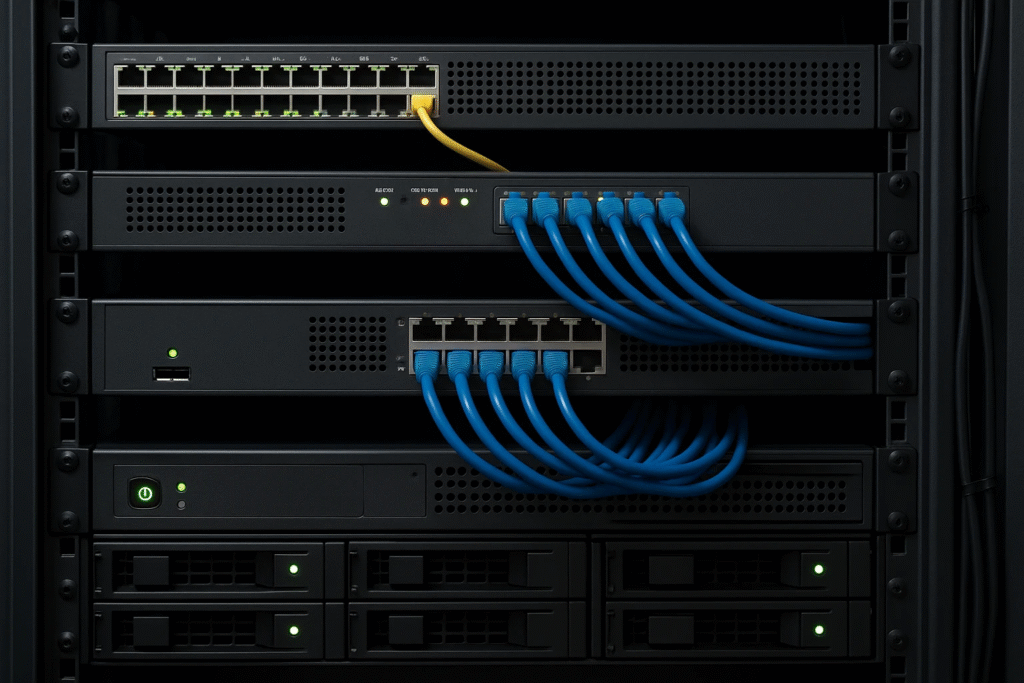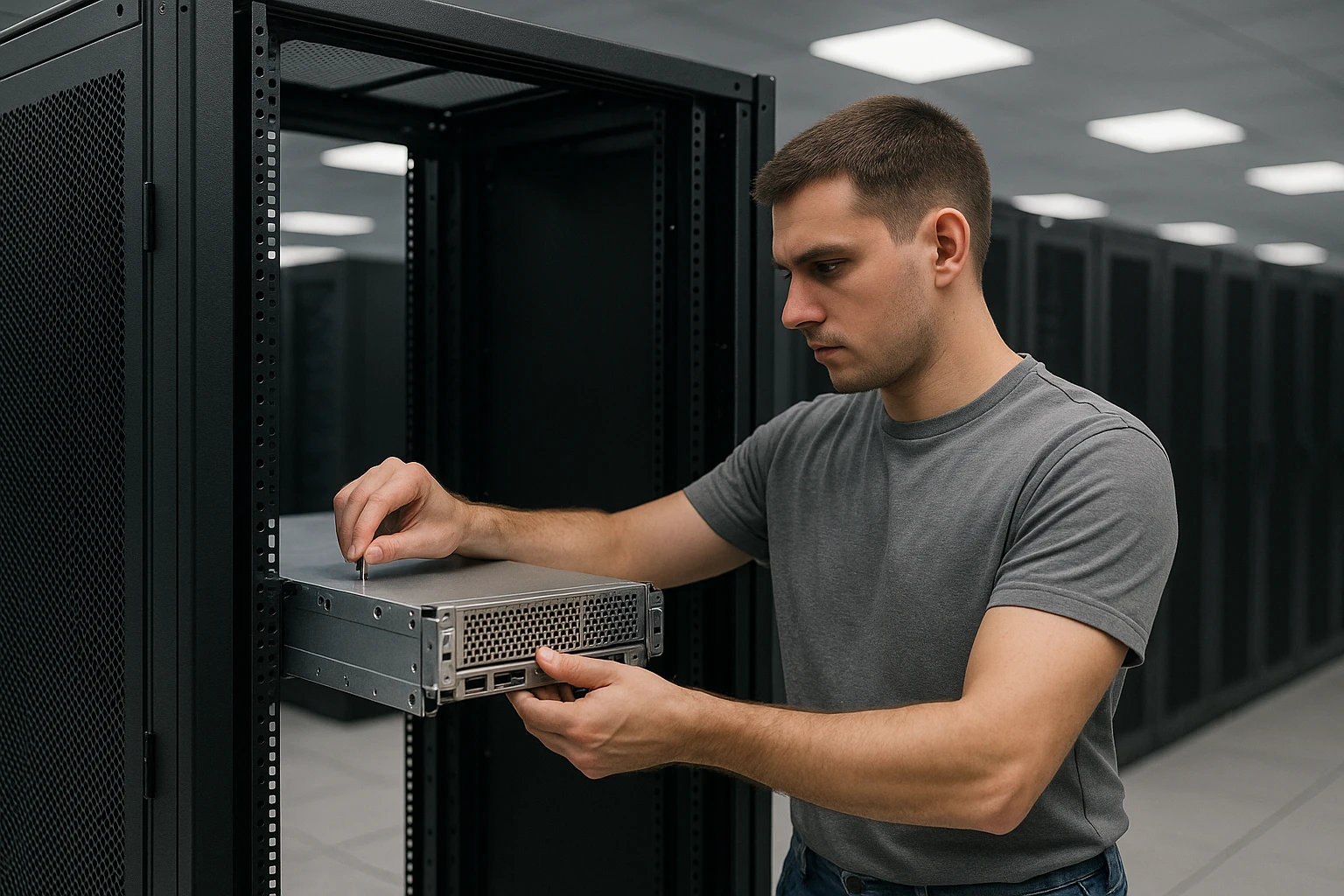
In modern business, the stability and speed of digital infrastructure determine not only the efficiency of operations but also the company’s competitiveness. Websites, corporate applications, databases, and SaaS platforms all require reliable performance and instant response. However, virtual solutions and cloud resources do not always provide the necessary level of control, performance, and security.
As workloads increase and tasks become more complex, companies face several limitations: unstable performance, restricted access to hardware configurations, and unpredictable cloud costs. At this point, the focus shifts to the Dedicated Server — a solution that gives businesses full control over hardware and guarantees stable operation under any workload.
Dedicated servers are used wherever performance and security are critical — from corporate systems and online stores to streaming services and gaming platforms.
What is a Dedicated Server
A Dedicated Server is a physical server fully allocated for use by a single company or project. Unlike virtual solutions, its resources — CPU, memory, disk space, and network — are not shared with other clients. All hardware operates exclusively to meet the needs of one customer.
This approach ensures maximum performance, stability, and security, making dedicated servers a key component of corporate infrastructure. They are used to host web applications, databases, virtualization environments, analytics systems, data storage, and other critical services that require high computing power and constant availability.
Key Features of a Dedicated Server
- Full Isolation. Unlike VPS or cloud solutions, only your system runs on a dedicated server. This eliminates the impact of “neighbors” and guarantees consistent performance.
- Full Control. The user manages the entire server — operating system, security settings, software, monitoring, and updates.
- Physical Infrastructure. The server is hosted in a professional data center that provides redundant power, cooling, network connectivity, and protection against unauthorized access.
- Flexible Configuration. You can choose the exact hardware specification — processor, amount of RAM, disk type (SSD, NVMe), network interfaces, RAID arrays, and more.
Thus, a dedicated server is the physical foundation for mission-critical systems where not only power and speed matter but also independence from other users’ infrastructure.
How a dedicated server works
The operation of a dedicated server is based on a simple yet reliable principle: all physical hardware resources are fully allocated to a single client. This ensures not only high performance but also flexibility in configuration, security, and administration.
Architecture and Components
A dedicated server consists of standard hardware and software components, just like any professional server system. The main ones include:
- Processor (CPU). Responsible for computing tasks. Servers typically use powerful processors such as Intel Xeon, AMD EPYC, and their server-grade equivalents designed for multi-threaded workloads.
- Random Access Memory (RAM). Determines how many tasks can be processed simultaneously. Server systems use ECC RAM modules that prevent errors and ensure operational stability.
- Storage. Usually SSD or NVMe drives are used to provide high-speed data access and redundancy (RAID arrays).
- Network Interfaces. Provide connectivity to the Internet and other systems — commonly gigabit or 10G interfaces with redundant channels.
- Operating System. The server runs on Linux (Ubuntu, Debian, CentOS) or Windows Server, depending on the client’s requirements.
Operating Principle
- Deployment and Connection. The server is installed in the provider’s data center and connected to power, cooling systems, and redundant network channels.
- Access Transfer to the Client. After installing the operating system and base configurations, the client receives full administrative access (root/administrator). From this moment, they control all operations independently.
- Configuration for Specific Tasks. The client can install their own applications, control panels (e.g., cPanel, Plesk, ISPmanager), security systems, or virtualization and containerization platforms (Docker, Kubernetes).
- Monitoring and Support. The provider is responsible for the physical infrastructure — power, network, and hardware replacement. The client manages the software layer and can use monitoring tools to track performance, load, and security.
Data Center Hosting
Almost all dedicated servers are hosted not in company offices but in professional data centers. This ensures:
- Uninterrupted power supply with N+1 redundancy;
- 24/7 temperature and humidity control;
- Physical security (biometric access, video surveillance);
- High network bandwidth and low latency.
Thanks to this, servers operate continuously 24/7 — which is crucial for SaaS projects, online platforms, and corporate systems.
In general, the principle of a dedicated server can be described simply: a company receives a powerful physical device located in a secure data center and manages it as its own resource — without the limitations typical of cloud or virtual environments.
Main advantages of a dedicated server
Switching to a dedicated server is a step companies take for the sake of control, stability, and long-term reliability. Unlike cloud or virtual solutions, a dedicated server provides enterprise-grade infrastructure without dependence on third-party resources.
Below are the key advantages that make this format optimal for growing companies and technology-driven projects.
1. Maximum performance
A dedicated server allocates all computing power to a single user. This means performance does not depend on the activity of neighboring clients, as it does with VPS or cloud environments. Servers of this level are equipped with modern processors, high-speed memory, and NVMe drives, ensuring:
- stable operation under heavy load;
- fast application response;
- no performance drops during peak traffic hours.
Such stability is especially important for SaaS platforms, online stores, and systems operating 24/7.
2. Security and full isolation
Since the hardware is used by only one company, the risks of data leaks or unauthorized access from other clients are eliminated. In addition, the user can implement any security policies independently — from encryption and firewalls to intrusion detection and prevention systems (IDS/IPS). For businesses, this means control not only at the application level but also at the infrastructure level — both physical and network.
3. Flexible configuration
A dedicated server can be fully adapted to business needs. The client chooses:
- the operating system;
- storage type and capacity;
- network interfaces;
- level of redundancy;
- software and control panel.
This approach allows you to optimize the infrastructure for specific scenarios — for example, databases, media processing, virtualization, or software development environments.
4. Predictable costs
Unlike cloud solutions, where the price depends on the number of operations and traffic volume, a dedicated server has a fixed monthly fee. This gives businesses predictable budgeting and eliminates unexpected bills caused by traffic spikes or resource overuse. The payment model is simple: the company knows exactly how much it pays and what it pays for. This is especially valuable for medium and large organizations with long-term planning.
5. Reliability and SLA
Professional dedicated server providers offer uptime guarantees (SLA) at 99.9–99.99%. The data centers hosting the equipment are equipped with redundant power, cooling, and connectivity systems.
This ensures:
- uninterrupted service operation;
- data protection;
- stable performance even during incidents or infrastructure updates.
6. Support and management
Although the company retains full control over the server, it does not have to handle physical maintenance. The provider takes care of:
- component replacement in case of failure;
- hardware monitoring;
- physical security;
- 24/7 technical support.
Some providers also offer managed solutions (Managed Dedicated Server), where an engineering team is fully responsible for system administration, backups, and updates.
Types of dedicated servers and use cases

Dedicated servers are used for a wide range of tasks — from data storage and corporate systems to multimedia and gaming. Their configurations can vary significantly depending on the company’s goals.
Let’s look at the main types and examples of how a dedicated server is used in business.
1. Corporate applications and databases
Large companies often host ERP, CRM, and other internal systems on dedicated servers to ensure stable business operations. These applications require high performance, reliable access, and strong data protection.
Benefits for corporate systems:
- high-speed processing of database queries;
- the ability to isolate sensitive data;
- flexible access control management;
- integration with internal VPN and office infrastructure.
This format is especially convenient for financial organizations, telecom companies, logistics, and manufacturing enterprises.
2. SaaS and platform solutions
Many SaaS platforms start with virtual environments but switch to dedicated servers as workloads grow. This helps stabilize performance and reduce dependency on cloud limitations.
Examples of use:
- CRM and ERP platforms;
- marketing and analytics services;
- corporate portals and client dashboards.
A dedicated server helps maintain stability as the user base grows and improves SLA reliability for clients.
3. Online stores and e-commerce platforms
E-commerce is one of the most performance-sensitive industries. Any delay or downtime leads to lost orders and customers.
Why a dedicated server is ideal for e-commerce:
- handles traffic spikes during promotions and sales;
- ensures fast website response time;
- supports secure payment operations (PCI DSS compliance);
- allows custom caching and CDN configuration for specific regions.
Many large online stores migrate to dedicated servers precisely for the sake of stability and scalability.
4. Media content, streaming, and video platforms
Real-time video and audio delivery require high network bandwidth and fast disk subsystems. Dedicated servers with SSD and 10G interfaces enable smooth streaming without packet loss or buffering.
Examples include streaming platforms, online cinemas, educational services, radio, and broadcasting. Such servers are often combined into clusters for load balancing and stream redundancy.
5. Game servers and gaming platforms
Gaming companies use dedicated servers to host game worlds, multiplayer environments, and user statistics. The main requirements are minimal latency (ping) and stable connectivity.
A dedicated server provides:
- low latency and fast data synchronization between players;
- scalability for large and popular projects;
- DDoS protection and isolation from other systems.
6. Hosting and virtualization
Hosting providers and IT companies often rent or purchase dedicated servers to deploy VPS platforms and virtual environments. A single physical server can host dozens of virtual instances managed via a control panel.
This allows them to:
- provide clients with guaranteed performance resources;
- optimize hardware utilization;
- maintain control over security and client segmentation.
Thus, dedicated servers are used in any field where stability, control, and scalability are essential. From corporate systems to video platforms — they remain a universal tool for building reliable infrastructure.
When to switch to a dedicated server
A dedicated server is not always necessary at the early stages, but it becomes critical when workloads and infrastructure requirements exceed the limits of VPS or cloud environments. Below are the key signs and scenarios when switching to a dedicated server is both justified and strategically beneficial.
1. Growing workload and audience
As the number of users or requests increases, virtual environments begin to hit their limits. Services slow down, and response times grow longer. If you notice unstable performance and frequent resource exhaustion on your virtual hosting, it’s a clear signal to move to a dedicated server.
A dedicated server allows you to:
- handle peak loads without downtime;
- support a larger number of simultaneous connections;
- maintain consistent performance as traffic grows.
2. Increased security requirements
For companies working with confidential data — financial, medical, legal, or corporate — security is a top priority. On VPS and cloud platforms, infrastructure is shared among multiple clients, which creates additional risks.
A dedicated server provides:
- physical data isolation;
- the ability to implement custom encryption and auditing policies;
- full control over access and network security;
- compliance with ISO 27001, GDPR, and PCI DSS standards.
If data protection is a critical aspect of your business, moving to a dedicated server is the obvious choice.
3. Need for a custom configuration
Many companies require a unique architecture — specific OS versions, custom libraries, or proprietary monitoring and virtualization tools. In virtual environments, such flexibility is limited by the provider’s restrictions.
On a dedicated server, you have full root access and complete configuration freedom. You can choose the virtualization system (VMware, Proxmox, Hyper-V), set up RAID arrays of any level, deploy containerization, and implement load balancing.
4. Unpredictable cloud costs
Cloud solutions are convenient at the start but their pricing can quickly become unpredictable — especially with high traffic, API requests, or data storage usage. A dedicated server offers a fixed monthly price and transparent terms: you know exactly how much you pay, regardless of user activity. This model provides financial stability and long-term savings, especially under constant infrastructure load.
5. Scaling and long-term projects
For projects designed to run for years, renting or purchasing a dedicated server is more strategic than relying on temporary cloud solutions. It ensures predictability, reliability, and scalability without external limitations. Companies in SaaS, e-commerce, telecom, and media often migrate to dedicated servers precisely for long-term resilience.
6. Lack of control and transparency in the current infrastructure
When your infrastructure turns into a “black box” — with no clarity on where data is physically stored, who manages the resources, or what processes occur at the hypervisor level — it’s time to switch to a dedicated server. Physical isolation, access to logs, custom security policies, and auditing help restore transparency and full control over your IT environment.
Dedicated server as the foundation of a reliable and manageable infrastructure

A dedicated server combines the key principles essential for modern business: performance, security, predictability, and control.
Control and autonomy
Unlike cloud or virtual solutions, a dedicated server provides the company with full control over its architecture. You decide which applications to run, how to protect your data, and which monitoring tools to use. This gives you autonomy and allows you to adapt the infrastructure to internal processes rather than the constraints of an external platform.
For business, this means independence, flexibility, and confidence that decisions are made based on your own priorities, not provider policies.
Enterprise-grade reliability and security
Dedicated servers are hosted in professional data centers with multi-level protection, redundant power, and high-speed connectivity. They provide guaranteed uptime (up to 99.99%) and compliance with international standards such as ISO 27001, SOC 2, and PCI DSS.
Physical isolation eliminates the influence of neighboring users and reduces the risk of data leaks. For companies handling personal or financial information, this is especially important — the infrastructure becomes part of the organization’s trust system and brand reputation.
Predictability and long-term efficiency
Fixed monthly payments and the absence of hidden fees make dedicated servers convenient for budget planning. At the same time, the company benefits from stable performance and the ability to use hardware for several years, upgrading it without having to rebuild the entire infrastructure. In the long run, a dedicated server often proves more cost-effective than cloud models, especially under steady load and continuous traffic growth.
A platform for scaling
A dedicated server becomes a logical step toward more complex architectures — clusters, hybrid solutions, and private clouds. It can be combined with other servers, load balancers, and storage systems, forming a unified environment that scales alongside the business.
Thus, a dedicated server serves as a transition point from local infrastructure to enterprise cloud ecosystems where everything remains under the company’s control. In an environment where performance and security directly impact competitiveness, a dedicated server becomes a strategic asset — ensuring application stability, data protection, and independence from the limitations of external platforms.

